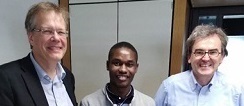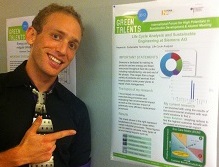National research systems are often described as ‘landscapes’ but they are actually networks, and Germany’s network is multi-layered and hyperconnected. It consists of some 750 publicly-funded organisations, including 108 universities and 210 universities of applied science and thousands of private businesses. There are also over 100 research networks, some covering sustainability, and Germany is at the hub of many European Union sustainability and climate research programmes.
Personal profiles of prominent research leaders can provide a view into Germany’s research nodes, their international connections and connection with Green Talents. For instance, Professor Joachim Schellnhuber is Chair of the European Institute of Innovation Technology Climate-KIC, founder of the influential Potsdam Institute for Climate (PIK) and regular Green Talents panel member. Looking at Green Talents’ profiles themselves, especially research stays since 2009, offers strong insights into Germany’s environmental research hubs and global connections.
About 65% of Green Talents’ research stays have been at universities. Owen Horwood (South Africa, 2011), who is now amongst other things a Non-Executive Director of Johannesburg City Parks and Zoo, did his research stay at Heidelberg University’s Centre for the Environment (HCE). He noted, ‘Interaction with Heidelberg’s vibrant academic community refined my perception of the scope of sustainability science and provided insight for enhancing integrated sustainability initiatives back home. My research stay was an exceptional opportunity for collaboration and knowledge exchange internationally.’
Binita Shah (India, 2010), a sustainability consultant specialising in Environmental Impact Assessments spent an ‘impressive’ three months at the United Nations University (UNU) - Institute for Environment and Human Security (EHS). She stayed at the World Risk Index - Vulnerability to Natural Disasters, focussing on Asia. ‘The stay gave me an excellent opportunity to benchmark my work against globally impactful research whilst honing my own practice.’
Universities, of course, work with state research organisations where about 43% of Green Talents made their stay. Juliana Aristéia de Lima (Brazil, 2009) chose to work at Professor Dr Landfester’s research group at the Max Planck Institute for Polymer Research (MPI-P) in Mainz. ‘It gave me the opportunity to start working with Janus Particles and then turn my focus to Transmission Electron Microscopy (TEM). I was also part of a round table discussion with the minister, Annette Schavan.’ Juliana is now a Fellow at the Laboratoire Procédés et Ingénierie en Mécanique et Matériaux (PIMM), Paris.
 Amongst the internationally recognisable organisations are less visible specialist institutions hosting Green Talents. Eyram Norgbey’s (Ghana, 2017) reception at the Federal Highway Research Institute (BAST), in Cologne, was like ‘being welcomed into a star-studded football club and being able to play with the best players in the world. Yes, that’s how I felt arriving at BAST.’
Amongst the internationally recognisable organisations are less visible specialist institutions hosting Green Talents. Eyram Norgbey’s (Ghana, 2017) reception at the Federal Highway Research Institute (BAST), in Cologne, was like ‘being welcomed into a star-studded football club and being able to play with the best players in the world. Yes, that’s how I felt arriving at BAST.’
One highly networked institution is unusual in that it is both a university and research centre, Karlsruhe Institute of Technology (KIT), where Dewei Zhao (China, 2010), Research Assistant Professor at The University of Toledo working on perovskite-based solar cells, made his stay. ‘Academics at KIT were positive about industry and my stay provided a foundation for my ongoing research into thin-film solar cells, and I helped create a collaboration between Germany and Singapore. Moreover, I had excellent access to infrastructure. My stay was very fruitful.’ KIT also welcomed Aluwani Nemukula (South Africa, 2009), now researching algae at the University of KwaZulu-Natal. He has returned twice and maintains contact with KIT’s researchers in bioprocessing engineering. Quite often, then, Green Talents’ research stays create or strengthen international collaboration.
Germany’s drive for knowledge transfer ensures that new knowledge gets feeds into the production of sustainable products.
Daniela Morais Leme (Brazil, 2010), Adjunct Professor at Federal University of Paraná (UFPR), stayed at BASF. ‘I improved my knowledge of in vitro toxicology and increased my understanding of the relationship between the goals of industry and academia, and established international scientific collaboration. I keep contact with BASF’s senior vice president of experimental toxicology and ecology’.
 And, Andrew March (USA, 2010) grew during his stay at Siemens to realise his own entrepreneurial potential. He is now CEO of Power Pay and founder of AM Tech. He thought, ‘the research stay was incredible, and a big benefit was getting a job at Siemens for 3.5 years! I had great access to infrastructure and personal networks at Siemens – where I met the now Chief Technical Officer at Power Pay – which has helped progress my ideas and career. I have the networks I do, with people who share my ambitions and ideas because of the Green Talents programme.’
And, Andrew March (USA, 2010) grew during his stay at Siemens to realise his own entrepreneurial potential. He is now CEO of Power Pay and founder of AM Tech. He thought, ‘the research stay was incredible, and a big benefit was getting a job at Siemens for 3.5 years! I had great access to infrastructure and personal networks at Siemens – where I met the now Chief Technical Officer at Power Pay – which has helped progress my ideas and career. I have the networks I do, with people who share my ambitions and ideas because of the Green Talents programme.’
Public policy collaboration is also essential to sustainability and Guan Ting (China, 2011), postdoctoral research fellow at School of Public Policy and Management at Tsinghua University, specialising in environmental and energy governance maintains contact with her professor colleagues at University of Duisburg-Essen, after an ‘intensely fruitful’ research stay.
Tonni Kurniawan (Hong Kong, 2010), now Associate Professor in Environment and Ecology at Xiamen University, summarised his view of Germany and the benefits of being a Green Talent, ‘Globalization means scientists should collaborate beyond national borders. This is essential also for developing scientists’ careers. For me the Green Talents award helped me boost citations of my research papers by 300% and my three-month research stay at Ravensburg-Weingarten University of Applied Sciences made my dream come true; living in the Land of Ideas.’
These examples of Green Talents’ research stays highlight 22 valuable German and international research venues. If you look at the research stays of all the Green Talents you will find 200 reference points to start your exploration of Germany’s sustainability and climate change research networks and their connections around our vulnerable ecosystem, the Earth.






